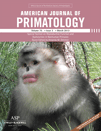
AMERICAN JOURNAL OF PRIMATOLOGY
metrics 2024
Championing Excellence in Primate Studies Since 1981
Introduction
AMERICAN JOURNAL OF PRIMATOLOGY is a leading peer-reviewed journal published by Wiley that focuses on the rich and dynamic field of primate research. With an ISSN of 0275-2565 and an E-ISSN of 1098-2345, this esteemed journal has maintained its commitment to advancing knowledge in primatology since its inception in 1981. Recognized in the Q1 quartile for both Animal Science and Zoology and Ecology, Evolution, Behavior and Systematics, it is ranked 84th out of 490 in Animal Science, and 188th out of 721 in Ecology. By publishing high-quality research articles, reviews, and theoretical contributions, the journal aims to foster a deeper understanding of primate biology, conservation, and behavior, making it an invaluable resource for researchers, professionals, and students alike. While not an open access journal, it provides essential insights into primate science, ensuring that vital findings are accessible to a broad audience. For further details, visit their office at 111 River St, Hoboken 07030-5774, NJ, USA.
Metrics 2024
 0.77
0.77 2.00
2.00 2.40
2.40 92
92Metrics History
Rank 2024
Scopus
IF (Web Of Science)
JCI (Web Of Science)
Quartile History
Similar Journals
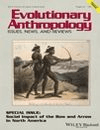
EVOLUTIONARY ANTHROPOLOGY
Charting New Territories in Human Evolution and HealthEVOLUTIONARY ANTHROPOLOGY is a premier journal published by WILEY, dedicated to advancing the field of anthropology through innovative and rigorous research. With an ISSN of 1060-1538 and an E-ISSN of 1520-6505, this journal boasts a remarkable Q1 ranking in both the Anthropology and Medicine (miscellaneous) categories, reflecting its significant impact within the academic community. Since its inception in 1992, it has continuously evolved, now encompassing a wide array of subjects pertinent to evolutionary studies and human health. Residing in the highly competitive Scopus rankings, it stands at an impressive rank of 10 out of 502 in the field, placing it within the top 2% of journals in Social Sciences - Anthropology. Researchers, professionals, and students alike will find this journal an invaluable resource for the latest findings, theoretical advancements, and discussions that shape our understanding of human evolution and its biological implications. While not categorized as an Open Access journal, EVOLUTIONARY ANTHROPOLOGY remains a vital outlet for high-quality scholarship, fostering dialogue and enriching knowledge across diverse audiences.
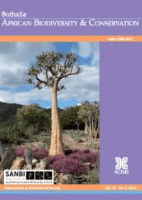
BOTHALIA
Exploring the intricacies of life on Earth.BOTHALIA is a prominent open-access journal dedicated to advancing the fields of Ecology, Evolution, Behavior, and Systematics, as well as Plant Science. Published by the South African National Biodiversity Institute (SANBI), this journal has been disseminating valuable research since 1978 and has embraced open access since 2014 to enhance the visibility and accessibility of scientific knowledge. With an ISSN of 0006-8241 and E-ISSN of 2311-9284, BOTHALIA plays a pivotal role in promoting biodiversity research in South Africa and beyond. In the recent Scopus rankings, it has been positioned at Q4 in both relevant categories, highlighting its contributions within the broader scientific community, despite being in its growing phase amidst competitive rankings. The journal aims to publish high-quality articles that address critical issues in biodiversity and ecological sciences, making it an essential resource for researchers, professionals, and students committed to understanding and managing our planet's biological heritage.
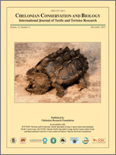
CHELONIAN CONSERVATION AND BIOLOGY
Uniting experts to tackle the challenges of chelonian biology.Chelonian Conservation and Biology is a distinguished academic journal dedicated to advancing the field of chelonian research, encompassing conservation, ecology, and biology of turtles and tortoises. Published by Allen Press Inc in the United States, this journal is well-regarded within the realm of Animal Science and Zoology, as well as Ecology, Evolution, Behavior and Systematics, holding a commendable Q3 ranking in both categories for 2023. With an ISSN of 1071-8443 and an E-ISSN of 1943-3956, the journal features a diverse range of articles aimed at professionals, researchers, and students, fostering an understanding of the critical challenges facing chelonians worldwide. Although not an open-access publication, Chelonian Conservation and Biology provides high-quality content, including original research, reviews, and case studies, encouraging engagement and collaboration among experts. With coverage extending from 2006 to 2024, the journal serves as a vital platform for disseminating knowledge and promoting conservation efforts essential to the survival of these remarkable species.
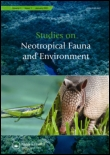
STUDIES ON NEOTROPICAL FAUNA AND ENVIRONMENT
Fostering Insights into Biodiversity and Conservation StrategiesSTUDIES ON NEOTROPICAL FAUNA AND ENVIRONMENT is a distinguished academic journal published by Taylor & Francis Ltd, dedicated to advancing the fields of Animal Science, Zoology, and Ecology. With an ISSN of 0165-0521 and an E-ISSN of 1744-5140, this journal has been a significant outlet for scholarly research since its inception in 1976, continuing to provide critical insights into neotropical biodiversity and the environmental intricacies of this rich ecological region through 2024. Recognized in the Q3 category for both Animal Science and Ecology, the journal ranks at #232/490 in Animal Science and Zoology and #402/721 in Ecology, marking it as a valuable resource for researchers, professionals, and students interested in ecological and zoological studies. By offering a platform for innovative research and comprehensive reviews, the journal aims to bridge the gap between theory and practical application, facilitating a deeper understanding of the unique challenges and conservation strategies relevant to neotropical ecosystems. Although not an open-access journal, it plays a crucial role in fostering academic discourse and knowledge dissemination in its field, ensuring that critical advancements in understanding neotropical fauna and environmental dynamics reach a diverse and engaged audience.
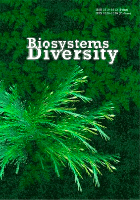
Biosystems Diversity
Connecting Scholars in the Quest for BiodiversityBiosystems Diversity is an esteemed open access journal published by the Oles Honchar Dnipro National University since 2009, based in Ukraine. Focusing on a wide array of topics within the fields of Ecology, Evolution, Behavior, and Systematics, the journal aims to foster the dissemination of cutting-edge research and innovative methodologies in understanding biodiversity and ecological interactions. With its ISSN 2519-8513 and E-ISSN 2520-2529, Biosystems Diversity has seen a consistent growth trajectory, earning a Q3 category for Ecology and a Q4 classification for Ecology, Evolution, Behavior and Systematics as of 2023, reflecting its dedication to high standards of scholarly excellence. The journal's rankings in Scopus solidify its relevance in the academic community, providing researchers and practitioners with vital insights into contemporary environmental challenges. As it converges towards its 2024 target, Biosystems Diversity continues to empower scientists, students, and professionals alike to explore new dimensions in the study of biological systems, offering crucial open access options for broader reach and engagement.
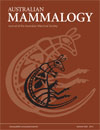
AUSTRALIAN MAMMALOGY
Pioneering Research in Zoology and Evolutionary BiologyAustralian Mammalogy, published by CSIRO PUBLISHING, is a pivotal journal in the fields of Animal Science and Zoology as well as Ecology, Evolution, Behavior and Systematics. With its ISSN 0310-0049 and E-ISSN 1836-7402, this esteemed journal has been instrumental in disseminating critical research findings since 2000, and continues to evolve up to 2024. Ranked in the Q2 quartile of both its categories for 2023, it showcases a diverse array of studies that contribute to understanding Australia’s unique mammalian fauna and its ecological dynamics. Researchers, professionals, and students will find valuable insights in its peer-reviewed articles, which are essential for advancing knowledge in these essential scientific disciplines. Located in Australia at UNIPARK, Locked Bag 10, Clayton, VIC, this journal remains committed to fostering scholarly communication within the global scientific community.
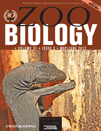
ZOO BIOLOGY
Unraveling the mysteries of wildlife through academic excellence.ZOO BIOLOGY, published by Wiley, serves as an essential academic journal in the fields of animal science and zoology. With a notable ISSN of 0733-3188 and an E-ISSN of 1098-2361, the journal has been a cornerstone of wildlife research and conservation since its inception in 1982. Spanning research contributions up to 2024, ZOO BIOLOGY holds an impressive reputation, ranked in the Q2 category for Animal Science and Zoology and Q3 in miscellaneous Medicine, reflecting its significant influence and scholarly impact. With a Scopus rank of #188 out of 490 in Agricultural and Biological Sciences, the journal maintains a strong position in the 61st percentile, showcasing the high-quality research it publishes. Although it does not offer open access, ZOO BIOLOGY provides valuable insights and advancements in the biological sciences, making it an indispensable resource for researchers, professionals, and students dedicated to advancing zoological science and animal biology.

Journal of Vertebrate Biology
Enhancing global awareness through scientific inquiry.Journal of Vertebrate Biology, a reputable publication established by the Institute of Vertebrate Biology in the Czech Republic, serves as a vital platform for research across the fields of Animal Science and Zoology, Aquatic Science, and Ecology, Evolution, Behavior and Systematics. With its ISSN 2694-7684 and a commendable 2023 Q2 ranking in multiple categories, this open-access journal embraces innovative scientific inquiry and fosters academic discourse. The journal's commitment to disseminating high-quality research is reflected in its Scopus rankings, positioning it within the top quartile in several impactful areas. As it continues to converge its focus until 2024, researchers, professionals, and students alike are encouraged to engage with cutting-edge studies that advance our understanding of vertebrate biology. This publication stands out not only in its scholarly contributions but also in enhancing global awareness of biodiversity and conservation issues.
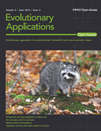
Evolutionary Applications
Illuminating the Path of Evolutionary DiscoveryEvolutionary Applications, published by WILEY, is a premier Open Access journal that has been dedicated to advancing the field of evolutionary biology since its inception in 2008. Renowned for its impactful research, the journal currently boasts an impressive impact factor and is recognized within the Q1 category for Agricultural and Biological Sciences, Ecology, Evolution, Behavior and Systematics, and Genetics, reflecting its contribution to high-quality, peer-reviewed articles. With a Scopus rank placing it in the top percentiles of its respective categories, it serves as a vital resource for researchers, professionals, and students seeking to explore the applications of evolutionary science across various disciplines. The journal's commitment to Open Access from 2008 onwards facilitates wider dissemination and accessibility of cutting-edge research, making significant strides in the study of evolutionary processes and their implications for both ecological and genetic innovations.
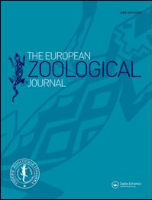
European Zoological Journal
Unveiling Insights into Animal Biology and ConservationEuropean Zoological Journal, published by Taylor & Francis Ltd, is an esteemed open-access publication dedicated to advancing the exciting field of zoology. Since its inception in 2017, this journal has progressively established itself as a vital resource for researchers, professionals, and students alike. With its Q2 ranking in Animal Science and Zoology as of 2023, the journal ranks in the 69th percentile among its peers, showcasing its influence and contribution to the discipline. The journal’s broad scope covers a wide range of topics within zoology, aiming to foster an understanding of animal biology and conservation efforts. As an open-access journal, it not only enhances the dissemination of knowledge but also encourages collaborative research across global communities. Situated in the United Kingdom, the European Zoological Journal invites submissions that contribute to the evolving discourse in animal sciences, and endeavors to support the scientific community in addressing pressing ecological challenges.